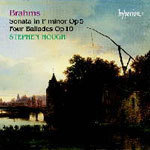
Brahms: Piano Sonata No 3 in F minor, Op. 5 / Four Ballades, Op. 10
 $45.00
Low Stock
add to cart
$45.00
Low Stock
add to cart
JOHANNES BRAHMS
Brahms: Piano Sonata No 3 in F minor, Op. 5 / Four Ballades, Op. 10
Stephen Hough (piano)
[ Hyperion / CD ]
Release Date: Tuesday 15 May 2001
This item is only available to us via Special Import.
"Hough casts a scattered, multicoloured light as if through stained glass … One could write a complete analytical essay on Hough's breathtakingly illuminating playing of the Second Ballade, but no words could convey the beauty he brings to the Fourth" (Pianist Magazine)
'So, this excellent disc is doubly welcome. Stephen Hough, with his powerfully sprung but flexible rhythm, rich variety of colour and touch, and command of deep-toned pianissimo, gives a compelling account of both the sonata and the four Op 10 ballades.'
(Sunday Times 20 May 01)
"Hough casts a scattered, multicoloured light as if through stained glass … One could write a complete analytical essay on Hough's breathtakingly illuminating playing of the Second Ballade, but no words could convey the beauty he brings to the Fourth" (Pianist Magazine)
'[Hough's] new disc must be one of the current prime choices in these pieces' (International Record Review)
'Stephen Hough is a great pianist, one of the finest now before the public' (Fanfare)
'Thoughtful, poetic and rich-toned readings of youthful Brahms. These pieces [Four Ballades] emerge as little gems, the songful Second as ear-catching as the haunted woodland sprites of the Third' (Gramophone)
'Beauty and meticulousness of Stephen Hough's playing…playing of great warmth and intimacy' (BBC Music Magazine)
'Readings of honesty and integrity, of unquestionable musicianship and pianism' (www.MusicTeachers)
'These are most successful performances and extremely rewarding ones' (musicweb)
Following his recent dazzling Liszt recital (CDA67085), Stephen Hough turns his attention to the finest works of the young Brahms. Brahms's three piano sonatas are early works, culminating with the epic F minor Sonata. Spanning five movements, with dramatic and wildly virtuosic outer movements, and a hauntingly beautiful slow movement (described by Claudio Arrau as "the greatest love music after Tristan, and the most erotic"), this is one of the defining piano sonatas of the mid-nineteenth century.
The Ballades Op 10 are essentially miniature tone poems. The first is famously "after the Scottish Ballad Edward", based on a gruesome tale of patricide. Although there are no programmatic hints for the remaining three Ballades, their dramatic contrasts and intense poetry suggest some sort of narrative, even if Brahms did not disclose his inspiration.
As well as being attuned to the autumnal introspection of late Brahms, Stephen Hough also has a special empathy with the passion and athleticism of Brahms's early piano writing. This exciting disc confirms his reputation as one of the most distinguished pianists of his generation.
Tracks:
Piano Sonata No 3 in F minor Op 5 [37'40]
Four Ballades Op 10 [21'31]
No 1 in D minor - Andante [3'48]
No 2 in D major - Andante [5'52]
No 3 in B minor - Intermezzo [3'40]
No 4 in B minor - Andante con moto [8'08]


